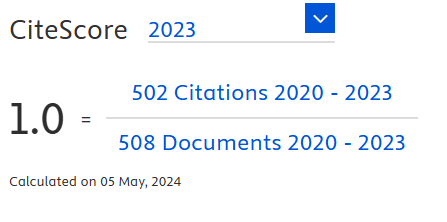The impact of the Russian-Ukrainian War on the food security of the Kingdom of Saudi Arabia
DOI:
https://doi.org/10.18006/2024.12(4).606.615Keywords:
Russian-Ukrainian war, Food security, Food production index, Consumer price index, Saudi ArabiaAbstract
The economic and social impact of the Russian-Ukrainian war was the focus of this study, which aimed to assess its effect on the food security of the Kingdom of Saudi Arabia. To achieve its objectives, the study utilized published data, food security index measures, and standard economic analysis. The findings revealed that the Kingdom's food security environment index increased from 58.1% in 2012 to 69.9% in 2022, indicating moderate food security throughout this period. The index was lower than the estimated counterpart for the rest of the Gulf Cooperation Council countries but exceeded the global average (113 countries) by 12.38% in 2022. Furthermore, the study demonstrated that a 10% increase in the estimated food production index and real per capita income led to a 2.72% and 6.55% increase in the food security index, respectively. Conversely, a 10% rise in the estimated consumer price index for foodstuffs resulted in a 1.74% decrease in the food security index. Despite the challenges posed by the Russian-Ukrainian war, the food security index is projected to improve for the Kingdom of Saudi Arabia, expected to increase from 72.4% in 2024 to 75.6% in 2030, attributed to the country's policy of investing in agriculture abroad and focusing on local agricultural investments such as vertical expansion, protected agriculture, and agricultural practices. This strategic approach ensures high-quality produce and facilitates significant financial surpluses, enhancing the country's capacity to import goods from overseas.
References
Abdel Nabi, M. A. (2022). The Economic Impacts of the Russian-Ukrainian War on the Central Asian Countries. Asian Horizons Magazine, Arab Republic of Egypt, 6, (10), 275-289.
Abdel Shafi, E. (2022). The Russian-Ukrainian War and the Future of the International Order, Al Jazeera Center for Studies, Doha, State of Qatar, May 3, pp. 1-23.
Acevedo, G. L., Nguyen, M. C., Mohamed, N., and& Hoogeveen, J. (2022). How rising inflation in MENA impacts poverty, World Bank, Published on Arab Voices, June 30.
Al-Bashabsheh, A.A.B. (2023). The Impact of the Russo-Ukrainian War on Food and Energy Security. Journal of Al-Quds Open University for Humanities and Social Sciences, 64, 1-15. DOI: 10.33977/0507-000-064-003. DOI: https://doi.org/10.33977/0507-000-064-003
Central Bank of Saudi Arabia (2022). Annual statistics 2021, publication date 5/31/2022.
Economist Impact (2023). Global Food Security Index, 2023, the GFSI website navigation guide
Economist Impact, Global Food Security Index: Country Ranking. (2021). Retrieved on June 3, 2022, from https:// impact economist.com/ sustainability/project/food- security- index/ Index.
Food and Agriculture Organization. (2024). FAO Food Price Index, website, release date March 8.
Food and Agriculture Organization of the United Nations. (2023). Food Outlook Biannual Report on Global Food Markets, Rome, November 10.
Ghanem, A. M., Alrwis, K.N., Alaagib, S.B.; Aldawdahi, N.M., Ibrahim O. Al-Nashwan, I.O., & Ghanem, H.A. (2023a). Effects of the Russian-Ukrainian war on the value of imports and the food trade balance for the Kingdom of Saudi Arabia. DOI 10.1108/AGJSR- 02-2023-0088. DOI: https://doi.org/10.1108/AGJSR-02-2023-0088
Ghanem, A. M., Al-Nashwan, O.S., Moneimkamara, S.A., & Ahamada, S.A. (2023b). The impact Russian-Ukrainian war on consumer prices of food products in Saudi Arabia. International Journal of Food, Nutrition and Public Health,13, (1- 2), 67- 79.
Gujarati, Damodar N., translated and review by Ghaffar, O.H.A. & Al-Dash, A. A. H. (2015). Basic Econometrics, the Second Part, Marekh House of Publishing, Cairo, pp. 983- 986.
Meligy, A., & Salem, N. (2023). (2023). Measuring the expected impacts of the Russian-Ukrainian war on food security in Egypt until 2027: An applied study. Egyptian Journal of Development and Planning, 31 (4), 58-86.
Ministry of Planning and International Cooperation of the Republic of Yemen, Economic Studies and Forecasts Sector (2022). Economic and Social Repercussions of the Russian-Ukrainian War on Yemen, Analytical Paper (3), June.
Downloads
Published
How to Cite
License
Copyright (c) 2024 Journal of Experimental Biology and Agricultural Sciences

This work is licensed under a Creative Commons Attribution-NonCommercial 4.0 International License.












